I am writing in reply to vice-president and provost Dr. Cheryl Regehr’s recent comments in the Toronto Star and The Huffington Post. Regehr suggests that U of T graduate students’ decision to strike did not follow legal, democratic, and constitutional procedures: “Unfortunately, at a meeting of only 800 out of 6,000 total CUPE members, those present decided to take all the members out on strike. We are surprised by this decision and think that the tentative agreement should be voted on by all 6,000 members of CUPE 3902 Unit 1,” she wrote in The Huffington Post. Regehr implies a lack of democratic accountability by CUPE. However, her argument is both vague and legally inaccurate.
First, Regehr’s comments about sending the tentative collective agreement (CA) to “all members” of the unit are disingenuous. If the provost believes that the results of a full member vote would have been any different than the vote we held, she would have exercised her legal right as an employer to request a full member vote. As stipulated in the 1995 Ontario Labour Relations Act Section 42.1:
“Before or after the commencement of a strike or lock-out, the employer of the employees in the affected bargaining unit may request that a vote of the employees be taken as to the acceptance or rejection of the offer of the employer… on the terms that he or she considers necessary direct that a vote of the employees to accept or reject the offer be held and thereafter no further such request shall be made.”
In short, the act specifically gives the employer — the provost and the university’s administration at large — the right to force a onetime ratification vote for all members on the tentative CA. Indeed, if the provost’s main concern is to give all members a vote, it is in her power to do so.
Secondly, the provost’s suggestions explicitly cut against the constitutional process as stipulated by the Unit 1 local bylaws:
“Before subjecting a Collective Agreement to a ratification vote… it shall first be approved at a unit meeting by a majority of votes cast (‘Ratification’ Section 14.2(b)).”
These bylaws are very clear on the matter. If the bargaining team unanimously endorses a tentative CA, all members are invited to participate in a general meeting. Only if passed by a majority of the members present is the tentative CA sent for approval to the unit’s membership at large. Not only did my colleagues at CUPE 3902 Unit 1 act according to their bylaws, in so doing they overwhelmingly voted not to send the agreement to a full ratification vote. While no hand count was taken at the meeting, the vote has been described as 90 per cent against (out of approximately 1,000 registered and present members).
This was not the first time U of T TAs have voted their disapproval of the university’s unwillingness to seriously consider many of their concerns. Between November 12 and 18, 2014 our members voted 90.3 per cent in favour of authorizing a strike in the largest vote turnout in Canadian academic union history. In so doing, they signalled that the issues we face are serious, immediate, and must be resolved. U of T TAs set a clear deadline, and our bargaining committee remained at the table to the end.
In sum, Regehr’s commentary on CUPE Unit 1’s actions is inaccurate and misleading. It also misrepresents the collective bargaining process stipulated by the union’s constitution and provincial labour laws. If the provost is truly interested in promoting the “full academic potential” of the graduate student community at the University of Toronto, I encourage her and the rest of the university administration to return to the bargaining table to negotiate a fair agreement for the university’s graduate students.
Mauricio Suchowlansky is a doctoral candidate in the Department of Political Science and a graduate fellow with the Centre for Reformation and Renaissance Studies.


